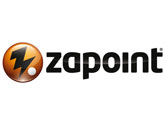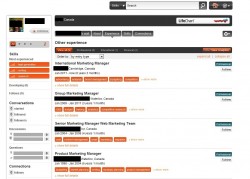 Those seemingly sober-minded folks at Zapoint are cooking up a sales gimmick as clever as it is provocative. Over the next 12 months, Zapoint will compile dossiers on the HR, sales, and marketing employees of 300 of Fortune’s biggest companies.
Those seemingly sober-minded folks at Zapoint are cooking up a sales gimmick as clever as it is provocative. Over the next 12 months, Zapoint will compile dossiers on the HR, sales, and marketing employees of 300 of Fortune’s biggest companies.
Then, says Chris Twyman, Zapoint’s founder and CEO, the HR departments will be presented with skills maps for their company’s personnel.
“If some of the 300 don’t like what we are doing that is fine,” says Twyman in a press release going out today. “It will not be long before they need to consider the implications of this campaign.”
Talk about throwing down the gauntlet. The 300, as the project is called, is nothing if not ambitious and attention-getting.
Once over the affront, though, HR and division heads might just discover a hidden reservoir of skills and talents among the workers. At a minimum, they’ll be able to see how their work groups compare to others.
Behind the stunt (and yes indeed, I played along with that reference to dossiers, which more accurately are talent profiles), behind the goading press release is serious purpose. Twyman acknowledged that the project is “as much a political statement to HR and recruitment” as it is a door opener for Zapoint’s sales staff.
 By combing the Internet, particularly the social networks, and compiling employee profiles, Zapoint is demonstrating how much more information about a worker is available than a company has in its records. Not only might that be valuable intelligence for succession planning and talent management, but when aggregated it paints a picture of the workforce that can be used for comparison, benchmarking, and recruiting.
By combing the Internet, particularly the social networks, and compiling employee profiles, Zapoint is demonstrating how much more information about a worker is available than a company has in its records. Not only might that be valuable intelligence for succession planning and talent management, but when aggregated it paints a picture of the workforce that can be used for comparison, benchmarking, and recruiting.
For example, Twyman told me during a briefing last week, “We can show an analysis between the top five salespeople in the skills area (and) the top five in the skills area of a competitor.”
Zapoint’s SkillsMapper crunches the data from the public web, marries it to an organization’s internal records, then presents the results in a graphical format that makes for easy comparisons. Since The 300 project won’t have access to internal records, it will only analyze the publicly available information, which can still be substantial.
If nothing else, when Zapoint is finished with The 300 it will have significantly broadened its database, allowing it to further refine its talent and skills benchmarks. That was behind its acquisition last year of the ill-fated Jobster. The purchase brought it some 800,000 profiles and about 250,000 active users.
(Besides selling its SkillsMapper to employers, Zapoint offers career planning services to individuals. Their profiles are searchable by recruiters.)
Zapoint has posted the 300 companies it will profile, and the dates when the skills mapping will be completed. Check here to see if you’re on the map and when you might expect to hear from Zapoint.
Before you get all ballistic, keep in mind that Zapoint’s employee profiles come from public sources. When the sales team comes calling, all you’ll get will be aggregate information. The individual names and profiles won’t be yours, unless you buy the service, which is, naturally, the point of The 300 project.
If HR shrugs off a corporate buy, Zapoint will pitch to the individual departments. Eventually, the employees themselves may get an opportunity to claim their profiles and make them public and available for review by outside recruiters who just might be your competitors.